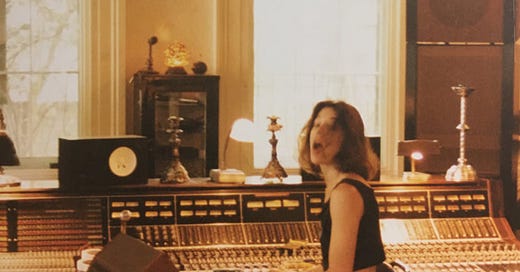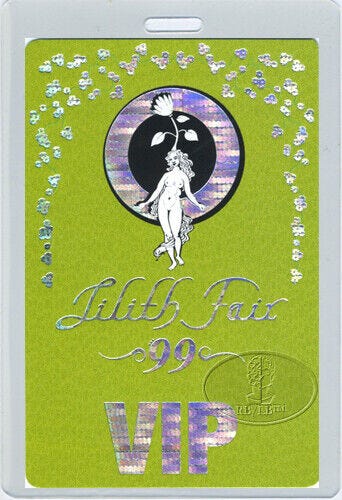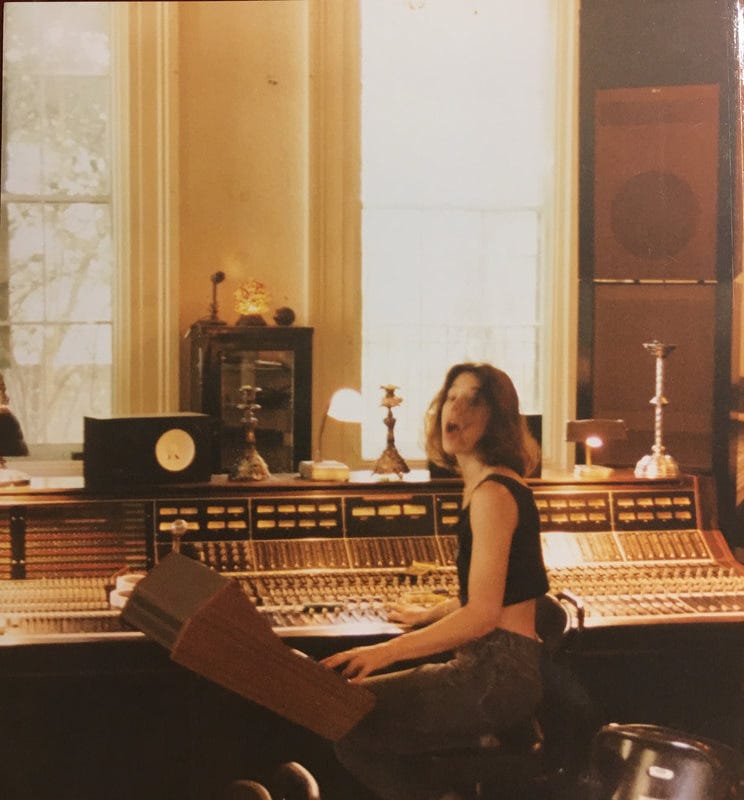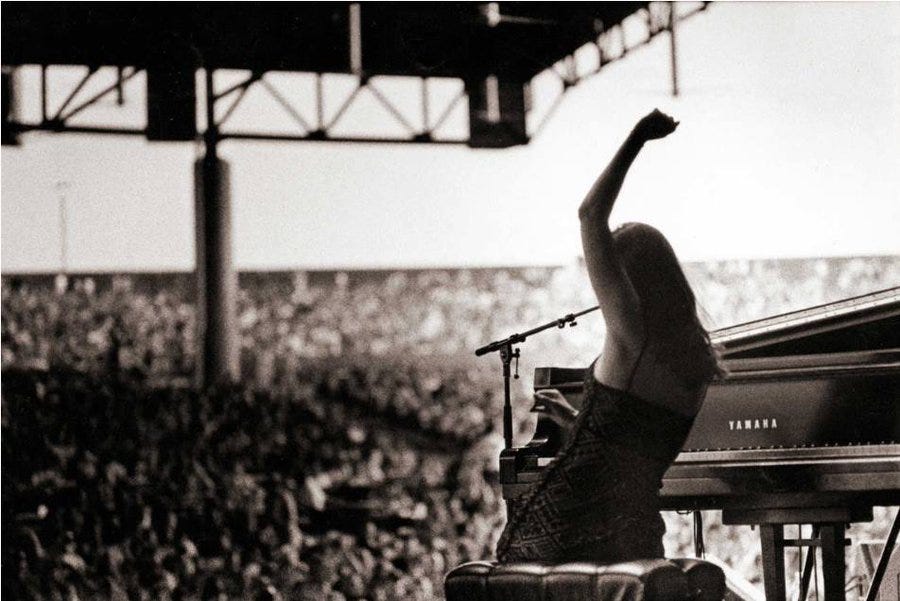Where have all the cowgirls gone?
Lilith Fair and the glaring lack of diversity in audio engineering.
On a recent visit home to North Carolina my mom revealed that she brought me (age 5) and my brother (age 9) to the Lilith Fair festival in 1997. Delighted as I was, my child-brain only remembers the iconic shirt with a naked woman on it that my mom wore frequently around the house. She said the three of us had a blast and did plenty of dancing.
Lilith Fair was a female-only music festival started by Sarah McLachlan that had a historical and successful run from 1997 to 1999. Missy Elliot’s first live performance was at Lilith Fair, that alone is sick as hell and only one of many endearing factoids about it. There’s a wonderful oral history of the festival and many remarked on artists and attendees bringing their children to the festival and feeling a distinct comfort and safety that could only ever exist at something like Lilith Fair. Deemed a radical “lesbopalooza” by critics before it could even get started, it was probably the only public place those women ever felt safe taking their bras off and screaming along to Tracy Chapman and Fiona Apple. Sounds cathartic, I only wish I was older than 5 years old so I could have done the same. Our radio and our world were clouded by male-dominated grunge and nu-metal, additionally the constant pressure to just… look like Britney Spears.
The thought of my young, independent mother strolling festival grounds with my brother and I in hand, it brought me to tears! It really wasn’t that long ago that radio promoters only allowed “one female artist” in their rotations (usually Sheryl Crow at this time), or bookers refused to put two female artists on a bill as it “would never sell” (this definitely still happens). Women’s careers were breaking on the festival, and others feared being pigeon-holed as a “Lilith Fair artist.” It had to be hard to say no to the opportunity, it was still probably the largest platform they were being offered, and it was a safe atmosphere. Imagine that!
The immediacy of something like Lilith Fair can’t really be emulated in other parts of the music industry. A complete reversal is always effective, the human instinct to say “wait, I’m not allowed to play this festival? Now I’m mad.” Sure you are, that feeling of exclusion is why Lilith Fair exists, but now you’re also paying attention. It’s like looking into a mirror, people were faced with the truth abruptly. A room full of women isn’t scary.
Art, gender, the people within it, it’s all fluid, and while there’s a healthier amount of gender-expansive people in the music industry now, there has not been enough time to properly disturb the male dominance of executive positions. Older generations are growing out of the business and understanding less because culture’s moving very quickly now. This is the exhausting truth and the industry needs to catch up to culture’s speed. If I were a 60-year-old record exec and someone tried to explain 100 gecs to me, I would just pick up a cigar hobby and get a vacation home. Just go. Make room for people who want to make the industry better.
Working at a record label, there is luckily the opportunity to diversify the staff and get creative about albums and their promotional assets. However, engineers and producers are one of those categories where you have mostly white men available to you and if you want something different, you need to dig. Plus, artists/labels working on an independent level are always prioritizing affordability and convenience, it’s essential to survival. I don’t think anyone should blame themselves for hiring only male engineers, it’s what’s offered to us! But I think we do need to recognize how slowly this sector of the industry is moving.
Over the last decade, only 12.7% of songwriters and 2.8% of producers were women (NPR). The Recording Academy conducted a “Women in the Mix” initiative in 2019 (which failed), asking participating labels and artists to hire at least two women in their engineering teams. While their study was super insightful, I don’t think this initiative reaches who it needs to reach — the hidden studio assistants and young dreamers in their bedroom. I say this because I was once one of those dreamers, I dreamed to make music like Alanis Morrissette, to bounce around the stage in exercise pants and glitter like Gwen Stefani. But they were superstars and I sure as hell didn’t know what the fuck a “Recording Academy” was. It’s difficult to keep track of these stats because it’s all behind the scenes work. There’s no representation. And we definitely possess the tools to give it representation. You can learn damn near anything on Youtube nowadays and there’s just no excuse for the endless pool of established male producers to be standing on the sidelines when they could be giving back and providing resources to undiscovered engineers.
Studios need to hire diversely and champion the women and gender-expansive employees, suggest them for work, decline their own opportunities and offer them to new engineers. I often think about Sheryl Crow’s 1999 album The Globe Sessions in which she fired her male producers/engineers and produced and performed the album herself with Trina Shoemaker. The album earned Trina Shoemaker the very first female Grammy win for “Best Engineered Album, Non Classical” 25 years after the category was created. It won Best Rock Album and earned Sheryl Crow a “Producer of the Year” nomination. Crow was definitely the golden child of this era, but holy shit! At least she used it for good. This was Trina’s break, and she went on to win more awards and still has a successful career today.
I think in general we need to shout out engineers more because young new artists looking for guidance may not know where to find proper credits and definitely don’t have an LP to check the liner notes on. They’re using mostly Instagram and Spotify. Luckily Tidal and Spotify are starting to roll out full credits on songs, but artists and their distributor have to provide that information, so give ‘em all you got. I use Tidal and read the credits all the time, the drummer and guitarist of Paramore are credited for “Vibes” on their new song “This Is Why.” Can only imagine this means some kind of atmospheric guitar or noise but with a credit this vague it feels to me that the possibilities are endless. Credit your engineers!
The frustrating takeaway here is that you can’t have a Lilith Fair for producers and engineers. I mean I’m not sure I could even get people to show up to an engineering expo or panel at SXSW. In a world of distraction, people can’t fight for an issue they believe in if there’s no representation or information handed to them. Equality is a slow process, but with a gender disparity this intense, I believe we can at least speed it up on the independent level.
Careers can jump from “indie” to “major” overnight in our era of technology. Though I usually hate the gray area between these two concepts — it could actually be powerful against the lack of non-male engineers. That gray area is where engineering careers break now. Take a look at Heba Kadry’s absolute knockout of a portfolio and the way it grew over time. Imagine if a group of big indie artists and a group of major label artists vowed to never hire a male engineer for their next records in the same year. Not a portion of the staff, the whole team. Not even forever, just for one historical year where we spread awareness and delivered the dreamers the information they need. That’s a Lilith Fair-level move in 2022. It’s a complete reversal, it makes a press-worthy statement. I mean if we spent a fraction of the time highlighting gender-expansive producers as we did dunking on Jack Antonoff, we might actually make some damn waves. And though it’s easy to pin this responsibility on women like Taylor Swift, Mitski, Phoebe Bridgers, I’m looking at The 1975 and Post Malone’s of the world too. A coalition of artists of all sizes employing exclusively non-male producing/engineering teams. A campaign like that would have monumental reach, history would be made, awards would be won, role models would be created.
I believe the studio is an instrument and its savants should be treated like artists too. There have been some great engineers to breakout in indie rock, though most of them had to be recognized a public-facing artist first (Melina Duterte of Jay Som and Sarah Tudzin of Illuminati Hotties are great examples).
Tudzin recently tweeted about how Paula Cole (Lilith Fair alum) is the only woman to be nominated for Producer of the Year without a male counterpart. This cursed wiki page of the award’s history will show you that in 48 years no women have ever won the award, only 6 have been nominated, and 3/6 of those nominations occurred between 1998 and 1999 to Lilith Fair-associated acts. It took 20 years for an individual woman to be nominated again in 2019, and that nomination went to Linda Perry of 4 Non Blondes, yet another career that became properly recognized in the 90s Lilith Fair era. There are no women nominated this year.
Amidst the pitiful statistics, it is promising to zoom out and recognize that Lilith Fair worked. So thank you Sarah McLachlan, thank you Paula Cole, let us not ask where the cowboys have gone, but where we can set them free so some new wranglers can show off. We’re still celebrating the festival 25 years later and I feel like I’m standing in an empty outdoor amphitheater in my halter top yelling “encore!” — how do we do it again?
Essay Fuel ⟡
Tori Amos - “Cornflake Girl”
Dar Williams - “As Cool As I Am”
Sarah McLachlan - “Possession”
Dionne Farris - “I Know”
Edie Brickell & the New Bohemians - “What I Am”







love love love. was listening to “cornflake girl” this morning 💗